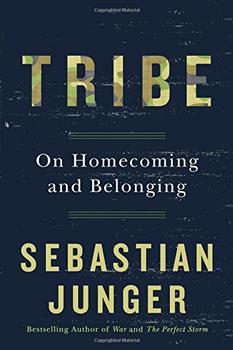Summary | Excerpt | Reviews | Beyond the Book | Readalikes | Genres & Themes | Author Bio

On Homecoming and Belonging
by Sebastian JungerINTRODUCTION
In the fall of 1986, just out of college, I set out to hitchhike across the northwestern part of the United States. I'd hardly ever been west of the Hudson River, and in my mind what waited for me out in Dakota and Wyoming and Montana was not only the real America but the real me as well. I'd grown up in a Boston suburb where people's homes were set behind deep hedges or protected by huge yards and neighbors hardly knew each other. And they didn't need to: nothing ever happened in my town that required anything close to a collective effort. Anything bad that happened was taken care of by the police or the fire department, or at the very least the town maintenance crews. (I worked for them one summer. I remember shoveling a little too hard one day and the foreman telling me to slow down because, as he said, "Some of us have to get through a lifetime of this.")
The sheer predictability of life in an American suburb left me hoping - somewhat irresponsibly — for a hurricane or a tornado or something that would require us to all band together to survive. Something that would make us feel like a tribe. What I wanted wasn't destruction and mayhem but the opposite: solidarity. I wanted the chance to prove my worth to my community and my peers, but I lived in a time and a place where nothing dangerous ever really happened. Surely this was new in the human experience, I thought. How do you become an adult in a society that doesn't ask for sacrifice? How do you become a man in a world that doesn't require courage?
Those kinds of tests clearly weren't going to happen in my hometown, but putting myself in a situation where I had very little control — like hitchhiking across the country — seemed like a decent substitute. That's how I wound up outside Gillette, Wyoming, one morning in late October 1986, with my pack leaned against the guardrail and an interstate map in my back pocket. Semis rattled over the bridge spacers and hurtled on toward the Rockies a hundred miles away. Pickup trucks passed with men in them who turned to stare as they went by. A few unrolled their window and threw beer bottles at me that exploded harmlessly against the asphalt.
In my pack I had a tent and sleeping bag, a set of aluminum cookpots, and a Swedish- made camping stove that ran on gasoline and had to be pressurized with a thumb pump. That and a week's worth of food was all I had with me outside Gillette, Wyoming, that morning, when I saw a man walking toward me up the on-ramp from town.
From a distance I could see that he wore a quilted old canvas union suit and carried a black lunch box. I took my hands out of my pockets and turned to face him. He walked up and stood there studying me. His hair was wild and matted and his union suit was shiny with filth and grease at the thighs. He didn't look unkindly but I was young and alone and I watched him like a hawk. He asked me where I was headed.
"California," I said. He nodded.
"How much food do you got?" he asked.
I thought about this. I had plenty of food — along with all the rest of my gear — and he obviously didn't have much. I'd give food to anyone who said he was hungry, but I didn't want to get robbed, and that's what seemed was about to happen.
"Oh, I just got a little cheese," I lied. I stood there, ready, but he just shook his head.
"You can't get to California on just a little cheese," he said. "You need more than that."
The man said that he lived in a broken-down car and that every morning he walked three miles to a coal mine outside of town to see if they needed fill-in work. Some days they did, some days they didn't, and this was one of the days that they didn't. "So I won't be needing this," he said, opening his black lunch box. "I saw you from town and just wanted to make sure you were okay."
From the book Tribe: On Homecoming and Belonging. Copyright (c) 2016 by Sebastian Junger. Reprinted by permission of Twelve/Hachette Book Group, New York, NY. All rights reserved.
When an old man dies, a library burns to the ground.
Click Here to find out who said this, as well as discovering other famous literary quotes!
Your guide toexceptional books
BookBrowse seeks out and recommends the best in contemporary fiction and nonfiction—books that not only engage and entertain but also deepen our understanding of ourselves and the world around us.